We try to stick with public lands on our hikes; private land often spells trouble.
In the 1980s, a week-long backpacking trip on national forest land in Colorado’s San Juan Mountains ended abruptly at a landowner fence.
On a 1990s trip to East Humboldt Wilderness in Nevada, we found all westside access trails (shown on topographic and national forest maps) cut off by ranches built to benefit from water from national forest mountains. Entering via public road on northeast side, we hiked a contour trail shown to link up these westside canyons—it was not maintained and we ended up hiking straight over the rugged ridge instead of looping around as planned.
On a 2014 hike in Shenandoah National Park in Virginia, we tried to link up two parallel canyon trails on park land separated by small sections of private land and a county road. We left our vehicle at a popular trailhead accessed by road through private ranches with National Park Service easement. After climbing the scenic canyon to Appalachian and park trails on the Blue Ridge, we dropped down second canyon on park trail ending at private property marked with red “no trespassing” signs. We didn’t want to trespass, but map showed only two-thirds mile down to public road for a loop back to our vehicle. Too steep to contour along the Park boundary. We took a cow route across green pastures—and were seen on the hill above by the farmer as we dropped towards county road. He overtook us on his ATV and gave us an angry lecture. “Don’t you people have any respect for private property?” No use discussing public access, easements, and recreational loop hiking.
In the middle of a 2017 trip to Blue Range Primitive Area in northeast Arizona, the national forest (NF) trail ended abruptly on private property—one of several holdings on the Blue River. Right past the Forest Service trail sign, a wire gate, buildings, vehicles, but no people. We hiked past the buildings and climbed over a metal gate. On the other side was a sign with a gun pointing out: “There is nothing here worth dying for.” Glad no one was home.
Private land is a strongly cherished concept in the U.S. It evolved from Roman and European law; an essay published by Lincoln Institute of Land Policy notes land ownership opportunity in North America attracted European immigrants leaving feudalism for political and economic freedom. The 4th Amendment of the U.S. Constitution prohibits taking of private land without compensation—a concept often argued against government environmental regulation.
In the 1600s, economist John Locke argued property was “a “natural right” from God and advanced a theory that if someone occupied and worked the land, he became entitled to ownership. Some U.S. laws might be based on this notion. Homestead Act of 1862 provided 160 acres of land to settlers in exchange for a small filing fee and five years of residence/labor. The Mining Act of 1872 allowed mining claims on public domain land subject to yearly work on the claim. Many Western ranches started with the land grants. The Blue Range private property (mentioned above) that we crossed originally was public domain land occupied illegally by settlers at turn of the 20th century who eventually got it as a grant from the government.
I feel awkward when I encounter private property that benefits from adjacent public land but is closed to the public—like a recent trek this year through the Pioneer Mountains in Idaho. We had left national forest land and had to cross a small section of creek on a private ranch to reach public land on the hillside half a mile away. (Muldoon Creek, which flowed from the national forest, was used by the private ranch for irrigation and for grazing cattle in its riparian area). The rancher told us to get off his land.
Legally, he was right. The Idaho Trespass Law of 2018 requires members of public accessing private land for hunting, fishing, or other purposes to acquire permission or incur fines starting at $300. As one boon for the public, Idaho Fish and Game Department has an Access Yes! program that compensates landowners to allow non-motorized public access. It’s a limited voluntary program with onus on the public to check with landowners, many who are hard to contact.
On the recent Pioneer trek, we also enjoyed good private land stewardship. After the trespass incident, we spent three days mostly on private land managed by two large landholdings, all within Access Yes! We hiked old jeep roads along willow-lined creeks, over ridges overviewing vast valleys, and up a beautiful canyon with Douglas-fir groves. One of the landowners has initiated conservation easements on several thousands of acres (limiting use to protect conservation values) and also funds ecological research and a non-profit organization that helps protect livestock from predators with non-lethal methods.
Cultural Christian Europeans who usurped North American land from the Native Americans, perhaps interpreted Genesis 1:26 (King James Version) in the Bible where God gave humans “dominion” as “ruling over” or doing what you please. A lengthy article on Christian responsibility towards creation points out this primitive “dominion” view has fostered and is blamed for many modern environmental ills. However, the Bible’s teaching on the earth, nature and God may be quite different than this earlier interpretation. Dominion, for instance, could mean a “transferred right”— people bear the image of God and must rule on behalf of God. They do not rule in their own right—they must reflect the attitude that God has toward his creation. Genesis 1:31 indicates God called all He made “very good” and that He still owns it. “All the earth is Mine.” (Exodus 19:5).
Perhaps we should also reexamine Biblical teaching about land ownership. In the Book of Deuteronomy, God told His Jewish people that every 50 years all land sales reverted back to original owner. This Jubilee had interesting economic, management, and stewardship ramifications since all land sales and management activity was inherently prorated to 50-year cycles; there was little incentive to accumulate massive amounts of land as some wealth investment. Land was viewed as available for human use for a time period, not a long-term lock-up or investment to reap vast profits.
Although I am not a fan of private property as a recreationist, I might have some of the same territorial instincts as the Pioneers rancher we encountered. We once owned a house with a big yard in a northern Utah. Our yard was a shortcut for neighborhoods to a church and school across the street, with an opening through our fence and a path through our yard. I was annoyed to see kids and even adults in Sunday best trespassing “my” territory.
To sum up these rambling observations:
- Our high value on private land might be based on our territorial instincts—but I think should be balanced against value on the “commons” and some sense of land being something we did not create that was loaned to us as caretakers. The United States has both concept of private land and public domain land that is reserved for public benefits.
- Private land near public land is an immense privilege to the private land owner with water rights, very cheap grazing rights, and little restriction on land practices that can greatly affect “downstream” users, and in some cases “exclusive” access to “their” nearby public land.
- Our proud Judeo-Christian heritage (based on the Bible) indicates a vastly different concept with land available for short-term stewardship but not for long-term speculation and profit.
- Programs like Idaho’s Access Yes! and conservation easements are steps in the right direction because they allow some benefit to private landowners who are willing to manage their lands in concert with public land management objectives.
- In the U.S. there is little we can do if private landowners wish to keep the public out—which is why public land is so important. Wilderness is particularly important because it is the only category of public land whose sole purpose is for the human visitor.
Perhaps if we saw land stewardship as a sacred responsibility, and land as something on loan from the Creator, it might change how we manage, use, or share it. Even with trespassing neighbors.


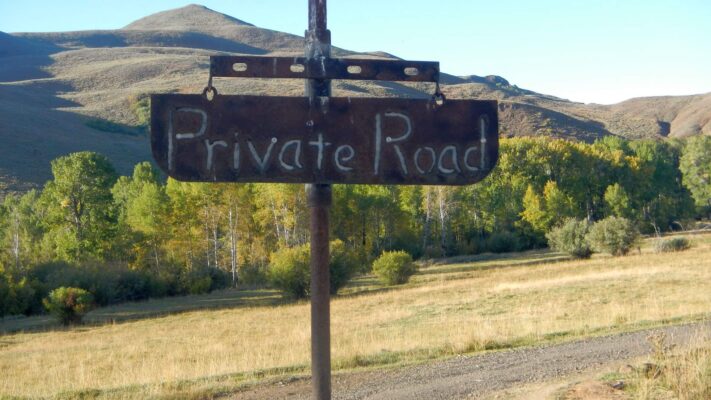
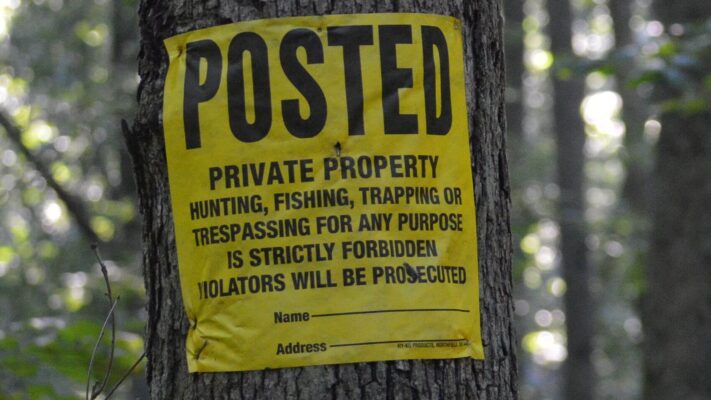
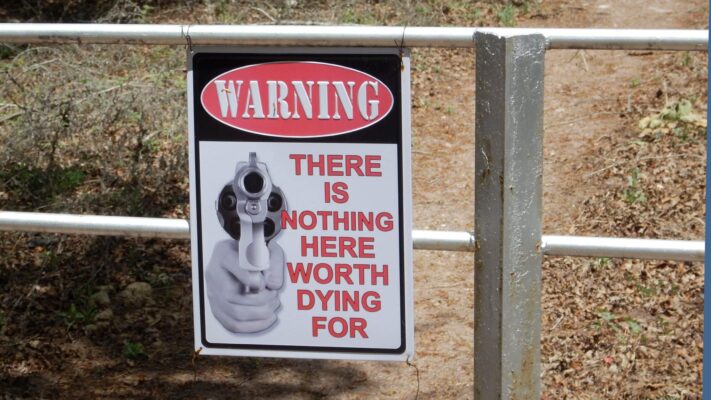
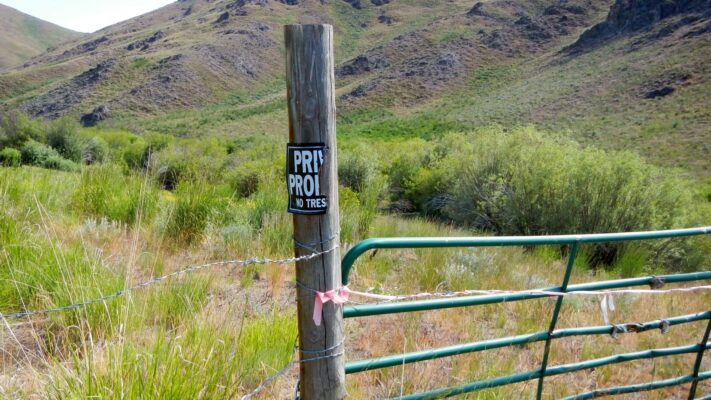
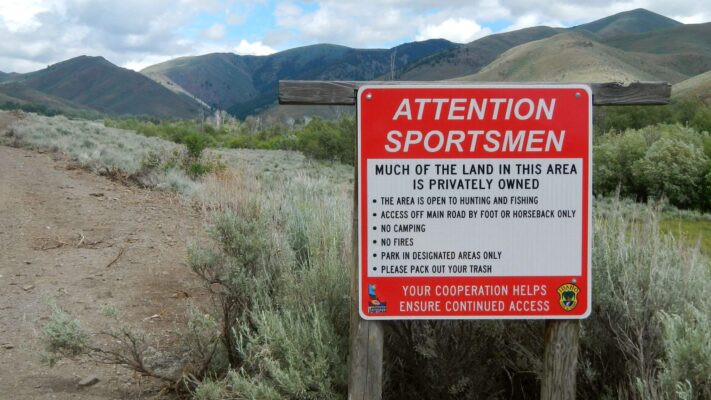
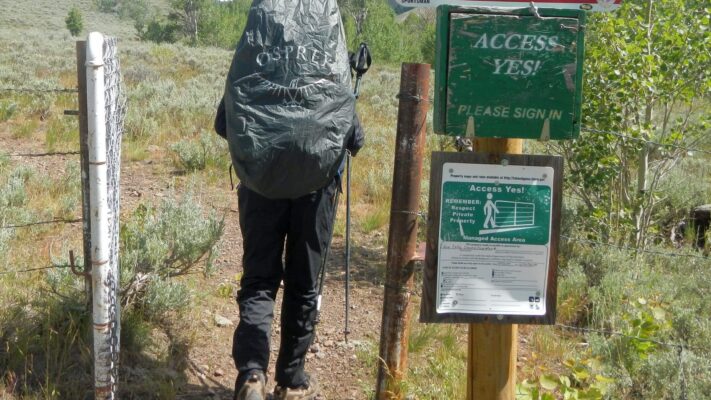
Private property is private property. Stop wirh the I’m a victim BS.
Thanks for your comment. You sound a bit angry; have you been offended by trespassers on your land? I don’t see myself as a “victim”; feel quite blessed to live in a place where there is lots of public land. However, disagree with your simple view that “private land is private land.”
The concept of private property is complex and fairly new for the human race; a product of Western Civilization starting with the Romans and applied to land tenure by European civilization.
Most lands in the Western U.S. were initially occupied by American Indians who saw land as gift from Creator with no notion of “individual ownership.” These lands were taken by force and Indians killed off, died of European-introduced diseases or herded off to reservations. The U.S. government over time distributed many of the lands (e.g. homesteading) to individuals to “own” and use supported by publicly funded “socialist” programs such as water development/ irrigation, grazing services on adjacent publicly owned land and road maintenance. Therefore it’s actually “stolen” redistributed land that now is in private ownership and yes, jealously guarded as a “right.”
Lol omg. this is the most ridiculous thing I’ve ever read. YOU sound a bit angry, not TTTCOTTH. Lol. Don’t trespass on people’s land. period. You have no rights and they do.
It looks like to me that you and MR. TTCOTTH are just out looking for people to argue with. That is not the purpose of this website or blog. I will include your comment and that will the last approved for you folks.
You’re putting a religous slant in support of your opinions in this article. Which can perhaps be construed as bias. You did not present a completely objective overview of the Private /Public land use issues. This would have kept focus on the issues themselves without clouding the readers mind. In these types of land issues presenting clear, concise facts and observations will allow the reader to make up their own mind as to what they’d like to see changed, if anything. It may also possibly make them aware of land uses issues near them and maybe they might consider being more proactive to get involved in public comment periods or meetings. .
I worked for a non profit Land access organization in the 90s. It was focused on supporting a particular recreational user group but also liasioned with other user groups such as Mtn bikers, Hikers, Fishermen etc. I know the intricacies of negotiations with Federal State Local and Private land managers along wth the general public and the associated recreationalists. At no time did we need or desire to use any religous aspects as a point in our meetings etc. The only time we included past history was to demonstrate a parcel’s historical access – either what once was or currently ongoing.
As the few who commented have pointed out : “Private Land is Private land”. It was not given to those owners. They either purchaed it or inherited it from earlier generations who purchased or homesteaded it. They have rights as private landowners. The recreational public has the priviledge to access public land. Its a priviledge because of the wildly different mindsets of human beiongs. That priviledge can be taken away if illegal use of and or abuse of the public land becomes a problem. Some people think they can do whatever they want because its public land i.e “I pay taxes to use this land so I can do whatever I want here” This has happened in many places, thru the decades, where trails and access were closed due to irresponsible visitors. Public Land managers will close and open areas with regard to whats best for the land (first) and public (second). Your blatant disregard for private property puts areas of established access and future negotiations for access at risk. You are not helping the situation at all. Rather you are increasing the risk of losing access. Why would a private land owner even begin to think about discussing an easement on his land when they hear about or read about incidents such as what you are instigating and writing about here ? When people dont follow the rules it screws things up for everyone.
Hi. Thanks for your comments. A blog is generally an opinion piece, like an editorial in a newspaper, offered to present ideas for response and discussion. Apparently, my blog succeeded in that for it has generated response from defendants of “private land rights”—-as I mentioned, a cherished European/ U.S. notion. You seem to have a bias against “religion” which is fine but sort of misses my point. I was looking at land rights/ tenure from a larger perspective which included the religious biases of my European ancestors who took New World land as some sort of divine right (see “Manifest Destiny” in settling the West) based on a very liberal interpretation of “dominion” (given to human race by the Creator) mentioned in their origin myths in the book of Genesis. In that context, I was examining the “Christian” basis of private land rights—if you will, a “family feud” within the Judeo-Christian family on how we might interpret the gift of land from God. “Religion” has been with all cultures since the beginnings of humanity on earth. Only since the Enlightenment have European based cultures like the U.S. democracy switched religious worship of natural phenomena to worship of ideological idols such as capitalism, technology, military, entertainment and institutions. We still have our gods like the ancients; they are a bit more subtle.
Within the narrow timeframe of U.S. history you appear to view land as an economic transaction in an orderly system created by our European ancestors. However, “land” predates all civilizations. In North America, only for a few hundred years has land been bought and sold; the indigenous peoples who lived here when my ancestors invaded had a very different concept of land; they believed it belonged to the divine and was utilized as a gift and could not be bought or sold. The first “sale” of most of the western U.S. land was a transaction between federal government and white Europeans after the land was stolen from native Americans, many of whom were killed off or sent off to a reservation. As you maintain, some land was bought for modest fees and a lot of it was “earned” simply by living on it a few years, other pieces were grants by the government. And in my experience working for federal government, much Western private land tenure is maintained by a lot of taxpayer- supported freebies: road construction and maintenance, water development and cheap grazing on public lands for example.
Your view of land use as “rights” for landowners and “privileges” for the public is a pretty new concept in human history. Recently the effectiveness of this tidy little system has been somewhat called into question by climate change problems such as catastrophic fire and drought in some places and floods in others. Perhaps our profitable private abuse of land for mining, clearcut logging and grazing of “invasive” European sheep and cattle has drastically changed the land and removed some of its built-in safeguards (which apparently evolved since there is no God in your view). I am not sure how you got the impression I am advocating trespass; I respect the laws. My examples were mistakes on our part where we didn’t do our research or couldn’t make a contact in advance. In the Pioneers example we spent most of our time legally hiking across two private landholdings whose owners participate in AccessYes! and welcomed us to visit their land and observe their stewardship. The rancher who challenged us was disputing perhaps a quarter mile crossing his federally subsidized base property between public lands. I see it just the opposite as you. I think landowners with “private rights” might note their huge privileges supported by government. I doubt they will turn back the firefighters when the forest fire doesn’t respect their private land boundary, ask the government to stop maintaining their road access or stop grazing their stock on public lands.